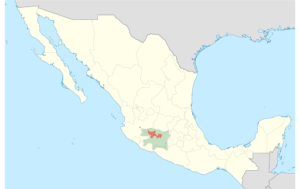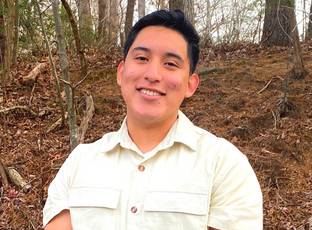Every Learner Celebrates Indigenous People’s Day within Hispanic Heritage Month
My name is Daniel Crisostomo. I am a student at UNC Charlotte. I am a finance accounting major and a music major.
Tell me about your heritage
I refer to myself as Latino Hispanic, but within that, I am technically Indigenous. My family is from Mexico and we’re from the state Michoacán. Within a bunch of states there are Indigenous groups and my parents are from one called Purhépecha. We’re from a small town where we speak a certain dialect called Purhépecha Tarasco.

Michoacán, Mexico
I consider myself that because my parents came directly from there and my whole family is from there and they still speak the language. I couldn’t speak to my great grandmother because I couldn’t speak the language but my grandmother only spoke the dialect so I couldn’t say a word to her but we can communicate. But that’s how direct our lineage from there is. I didn’t know I could consider myself Indigenous until I got here [UNCC] because I’d always considered people would assume I’m white but I didn’t realize that Indigenous could be considered Native American. It was really conflicting for me to realize because people would say to me, “You’re technically white.” I went to early college, in community college this one professor told me that I’m white. She looked at me directly and told me that I’m white. And so I believed that the whole time until I got here. It made me think, even though my mom grew up speaking the [Purhépecha Tarasco] dialect and so did my dad, and I couldn’t speak to my grandmother or my great grandmother, you know? It was really conflicting for me to realize that. I think for Hispanics it’s hard to put an identity within that because we’re technically an ethnicity. I believe a lot of Hispanics have the same issue that we don’t really…it’s really hard for us to identify with one…put ourselves in a box and identify ourselves with one thing.
What do you want people to know about your heritage?
That we can contribute more than what it seems like. I know that when you think of Hispanics, it’s sad but a lot of people don’t consider us as artists or consider us…you know we can be bankers, we can be CEOs. I believe that once you start incorporating views and all of the things that we have accomplished, it could open more opportunities for Hispanics. To see us look better as people say, “Oh, Hispanics did this.” And then Hispanics themselves can also believe they can accomplish those things as well.
It’s important to realize that Hispanics aren’t just brown. We all look different. You know, my pastor, he’s from Panama. He’s Hispanic and considers himself Latino, and he considers himself Black. We speak the same language, we just look different. And I think it’s important to know that. We all look different. We all come in different sizes and different colors, but we’re all [Latino]. We consider ourselves [Latino] and it’s important that other people [understand that about us].
Excerpt from Daniel’s submission to What Our Best College Instructors Do: Reflections by students about meaningful learning experiences:
As a Latinx student in the music department of UNCC, it can be difficult to find representation in music and its subsequent subjects. Classical music has “endowed” white wealthy men with privilege that minorities and women have not had. As a minority student, it’s disheartening to realize classical music was never meant for you. However, despite the lack of diversity in classical music, Dr. Grymes, the professor of Music History at UNCC pushes for the inclusion of composers and musicians which history has overlooked due to their skin color. Dr. Grymes combats the lack of diversity within music’s history by acknowledging lesser known composers of color within his teachings. Dr. Grymes opened a door for me and affirmed my identity in music. My professor made me feel like I matter and that this professor cared about students as an individual. – Daniel Crisostomo, Music History
Read What Our Best College Instructors DoDaniel Crisostomo is majoring in finance accounting and music at the University of North Carolina in Charlotte. His family are members of the Purhépecha from the Michoacán state in Mexico, where the Indigenous dialect is Purhépecha Tarasco.


